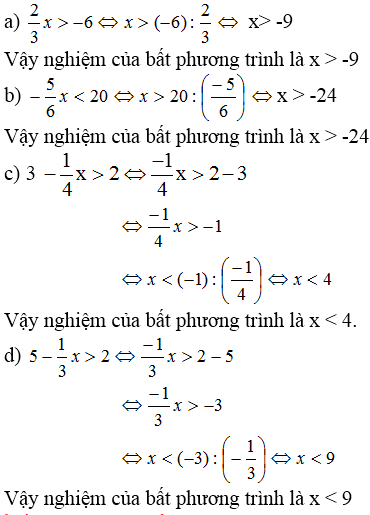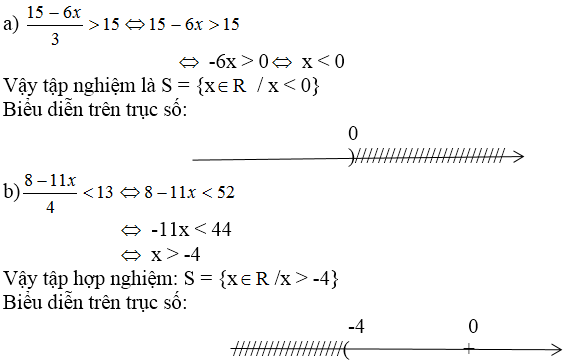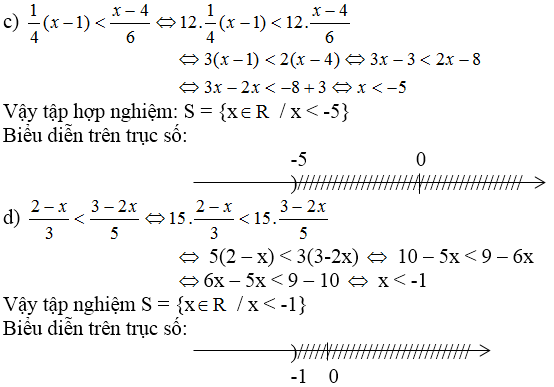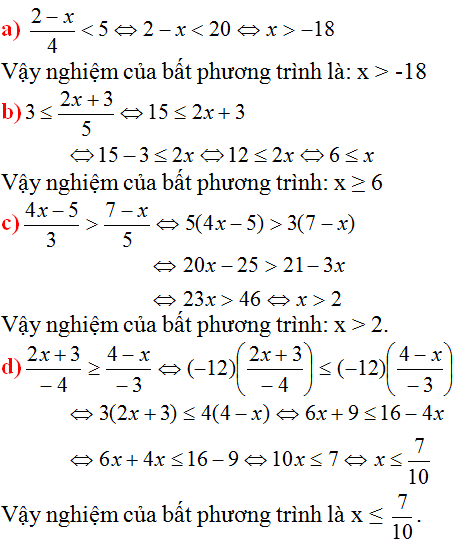Hãy nhập câu hỏi của bạn vào đây, nếu là tài khoản VIP, bạn sẽ được ưu tiên trả lời.

a) -2x > 23 ⇔ x > 23 + 2 ⇔ x > 25.
Vậy nghiệm của bất phương trình là x > 25
Nhận xét: Sai lầm là: khi tìm x phải nhân hai vế với \(-\dfrac{1}{2}\) hoặc chia hai vế cho -2 và đổi chiều bất phương trình
Lời giải đúng: -2x > 23
⇔x < 23 : (-2)
⇔x < -11,5
Vậy nghiệm của bất phương trình: x < -11,5
b) \(-\dfrac{3}{7}x>12\Leftrightarrow\left(-\dfrac{7}{3}\right).\left(-\dfrac{3}{7}\right)>\left(-\dfrac{7}{3}\right).12\Leftrightarrow x>-28\)
Vậy nghiệm của bất phương trình là x > -28.
Nhận xét: Sai làm là nhân hai vế của bất phương trình cho mà không đổi chiều bất phương trình.
Lời giải đúng:
\(-\dfrac{3}{7}x>12\Leftrightarrow\left(-\dfrac{7}{3}\right).\left(-\dfrac{3}{7}x\right)< \left(-\dfrac{7}{3}\right).12\)
⇔ x < -28
Vậy nghiệm của bất phương trình là x < -28.

a: \(x< -9:\dfrac{3}{2}=-9\cdot\dfrac{2}{3}=-6\)
b: 2/3x>-2
hay x>-2:2/3=-3
c: \(2x>\dfrac{9}{5}-\dfrac{4}{5}=1\)
hay x>1/2
d: \(\Leftrightarrow x\cdot\dfrac{3}{5}>6-4=2\)
hay x>2:3/5=2x5/3=10/3

a)11x-7<8x+7
<-->11x-8x<7+7
<-->3x<14
<--->x<14/3 mà x nguyên dương
---->x \(\in\){0;1;2;3;4}
b)x^2+2x+8/2-x^2-x+1>x^2-x+1/3-x+1/4
<-->6x^2+12x+48-2x^2+2x-2>4x^2-4x+4-3x-3(bo mau)
<--->6x^2+12x-2x^2+2x-4x^2+4x+3x>4-3+2-48
<--->21x>-45
--->x>-45/21=-15/7 mà x nguyên âm
----->x \(\in\){-1;-2}

a: \(x>3:\dfrac{1}{2}=6\)
b: \(x>-2:\left(-\dfrac{1}{3}\right)=6\)
c: \(x>-4:\dfrac{2}{3}=-6\)
d: \(x< -6:\dfrac{3}{5}=-10\)

a) \(x^2\) - x( x - 3) > 2x + 5
<=> \(x^2\) - \(x^2\) + 3x > 2x +5
<=> x > 5
Vậy bất phương trình có nghiệm x > 5.
Biểu diễn:
0 5
b) \(\dfrac{x\left(2x-1\right)}{12}\) - \(\dfrac{x}{8}\)< \(\dfrac{x^2-1}{6}\) - \(\dfrac{x+4}{24}\)
<=> \(\dfrac{4x^2-2x-3x}{24}\)<\(\dfrac{4x^2-4-x-4}{24}\)
<=> \(4x^2\) - 2x - 3x < \(4x^2\) - 4 - x -4
<=> -4x< -8
<=> x>2
Vậy bất phương trình có nghiệm x>2.
Biểu diễn:
0 2
![]()

Bài 1. Giải các phương trình sau
a) \(5\left(x-2\right)=3\left(x+1\right)\)
\(\Leftrightarrow5x-10=3x+3\)
\(\Leftrightarrow5x-3x=10+3\)
\(\Leftrightarrow2x=13\)
\(\Leftrightarrow x=\dfrac{13}{2}\)
Vậy \(S=\left\{\dfrac{13}{2}\right\}\)
b) \(\dfrac{2x}{x+1}+\dfrac{3}{x-2}=2\left(1\right)\)
Điều kiện: \(x+1\ne0\Leftrightarrow x\ne-1\) và \(x-2\ne0\Leftrightarrow x\ne2\)
\(\left(1\right)\Leftrightarrow\dfrac{2x\left(x-2\right)}{\left(x+1\right)\left(x-2\right)}+\dfrac{3\left(x+1\right)}{\left(x+1\right)\left(x-2\right)}=\dfrac{2\left(x+1\right)\left(x-2\right)}{\left(x+1\right)\left(x-2\right)}\)
\(\Rightarrow2x\left(x-2\right)+3\left(x+1\right)=2\left(x+1\right)\left(x-2\right)\)
\(\Leftrightarrow2x^2-4x+3x+3=2x^2-4x+2x-4\)
\(\Leftrightarrow2x^2-4x+3x-2x^2+4x-2x=-3-4\)
\(\Leftrightarrow x=-7\left(N\right)\)
Vậy \(S=\left\{-7\right\}\)
c) \(|2x+7|=3\)
\(\Leftrightarrow2x+7=3\) hoặc \(2x+7=-3\)
.. \(2x+7=3\Leftrightarrow2x=-4\Leftrightarrow x=-2\)
.. \(2x+7=-3\Leftrightarrow2x=-10\Leftrightarrow x=-5\)
Vậy \(S=\left\{-2;-5\right\}\)
Bài 2 bạn ghi rõ đề lại nha r mik giải lun cho
Bài 2. Giải các bất phương trình sau:
a) \(\left(x+2\right)^2< \left(x-1\right)\left(x+1\right)\)
\(\Leftrightarrow x^2+4x+4< x^2-1\)
\(\Leftrightarrow x^2+4x-x^2< -4-1\)
\(\Leftrightarrow4x< -5\)
\(\Leftrightarrow x>-\dfrac{5}{4}\)
Vậy \(S=\left\{x/x< -\dfrac{5}{4}\right\}\)
Câu b mik tính ko ra nhá sorry!!!!!!!!!!

a) \(\dfrac{4\left(x-4\right)}{12}\)-\(\dfrac{3x}{12}\)-\(\dfrac{12}{12}\) = 0
\(\dfrac{4x-16-3x-12}{12}=0\)
\(\dfrac{x-28}{12}\)\(=0\)
x - 28 = 0
x = 28
Vậy x = 28



